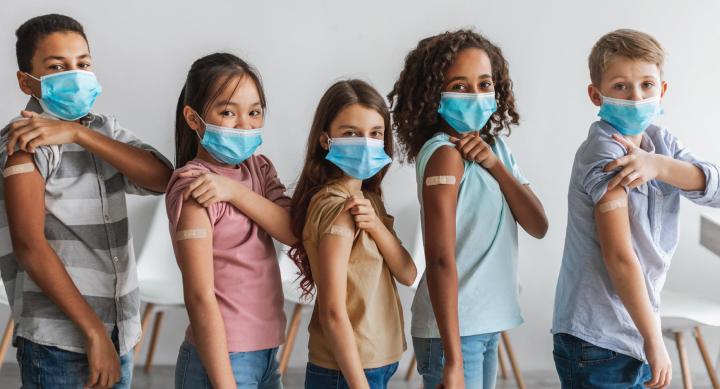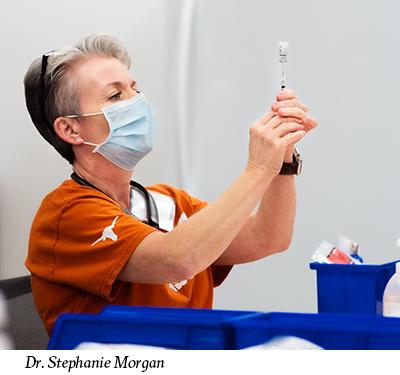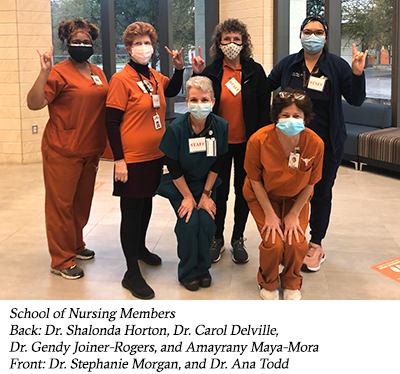
Stephanie Morgan, PhD, RN, FNP-BC, is no stranger to setting up and maintaining COVID-19 vaccination clinics. Thanks to her work with the team of nursing faculty and students, other health care providers, and volunteers that was formed in December 2020 when the vaccine first became available, she has been able to pull together and train teams to work with children, ages 5 to 11 in elementary and middle schools in Del Valle, an underserved community in southeast Austin.

On many weekdays, Dr. Morgan, director of The University of Texas at Austin School of Nursing’s Wellness Centers, can be found preparing for a vaccine event scheduled for the following day.
“Depending on the size of the event we need one to two non-clinical check-in individuals, two to four vaccinators, one to two mixers, one observation individual and a clinical lead,” she said. “On the day of the event, we estimate the number of vaccines to be administered and pack vaccine and supplies according to that estimation.”
The team arrives at the event one hour before the start time to set up and prepare the first vials of vaccine. Once they assemble, they conduct a brief with team members so everyone is clear on the plan and can ask questions.
“Likewise, when the vaccine clinic event is over, we debrief to determine what worked well and identify opportunities for improvement next time,” Dr. Morgan said. “At the conclusion, an event report is required to capture a summary that includes the type of vaccine(s) administered, doses given (first, second, immunocompromised or booster) and totals. It also includes doses wasted and if the waste was in a vial or syringe.”
Across town, Amayrany Maya-Mora, BSN, RN, and public health nurse at the School of Nursing’s Children’s Wellness Center (CWC), begins her day by checking the clinic’s refrigerator and freezer temperatures to ensure that all vaccines are maintained in the proper storage conditions. She then checks in with the front office staff to see if any children are waiting to receive vaccines during the morning walk-in clinic.
“During our daily walk-in clinic at CWC, which runs from 8 to 9 a.m., we usually serve around five to seven children,” Maya-Mora said. “I follow this up by entering vaccine data into Immtrac, the state vaccine registry, order vaccines and supplies, and prepare for any upcoming vaccine events.”

The CWC staff spent a lot of time prior to the Centers for Disease Control and Prevention authorization of the Pfizer and BioNTech SE COVID-19 vaccine for use in children 5 to 11 years old. Once the authorization was given in October 2021, the UT Austin School of Nursing was primed to begin providing it at both the CWC and the Family Wellness Center in addition to the area schools.
“Although the basic foundation for providing vaccinations at CWC was already in place, we still needed to provide more specific training,” Maya-Mora said. “We already give vaccines to children, but the COVID vaccine is different in its storage and reconstitution. Plus, we knew training would help boost the confidence of outside volunteers and nursing students. Vaccinating young children can be stressful if not done properly.”
Fortunately, Eduardo Chavez, PhD, RN, and a clinical assistant professor at the School of Nursing, had created a power-point training outlining creative ways to help volunteers feel confident and create a more relaxed atmosphere for children getting vaccinated. The slide show demonstrated how to safely hold pediatric patients, addressed appropriate needle lengths and provided communication techniques on how to talk honestly to children. “It’s important to be honest with children,” Maya-Mora added.
In addition, the team provided information to parents and others in the community.
“We made available information about studies and trials regarding the risk of side effects and what types of side effects they might expect,” Maya-Mora said. “There has been a great response, and parents have been very excited about our being able to partner with the Del Valle Independent School District and offer vaccines at their children’s schools. Unlike the CWC, not all pediatric clinics around the Austin area offer the vaccine, so we also provide Saturday clinics at Dailey Middle School and at the Opportunity Center at Del Valle High School. These walk-in clinics will be open through January from 9 a.m. to 2 p.m. It’s very important for parents to remember it’s a two-shot process.”
“Because the School of Nursing was prepared to administer vaccines as soon as they arrived, Del Valle ISD was the first Travis County school district to offer vaccinations in their schools with both doses available before the end of the year,” Dr. Morgan said. “That will amount to an average of 70 vaccinations given at each of the nine elementary schools in Del Valle. Parents who take advantage of these free clinics in their own communities can now relax, knowing that their kids — and their schools — are safer. Vaccinating children is an art, but with training, encouragement, and teamwork, we can increase the number of vaccinators and ensure that children are able to receive the COVID vaccine.”